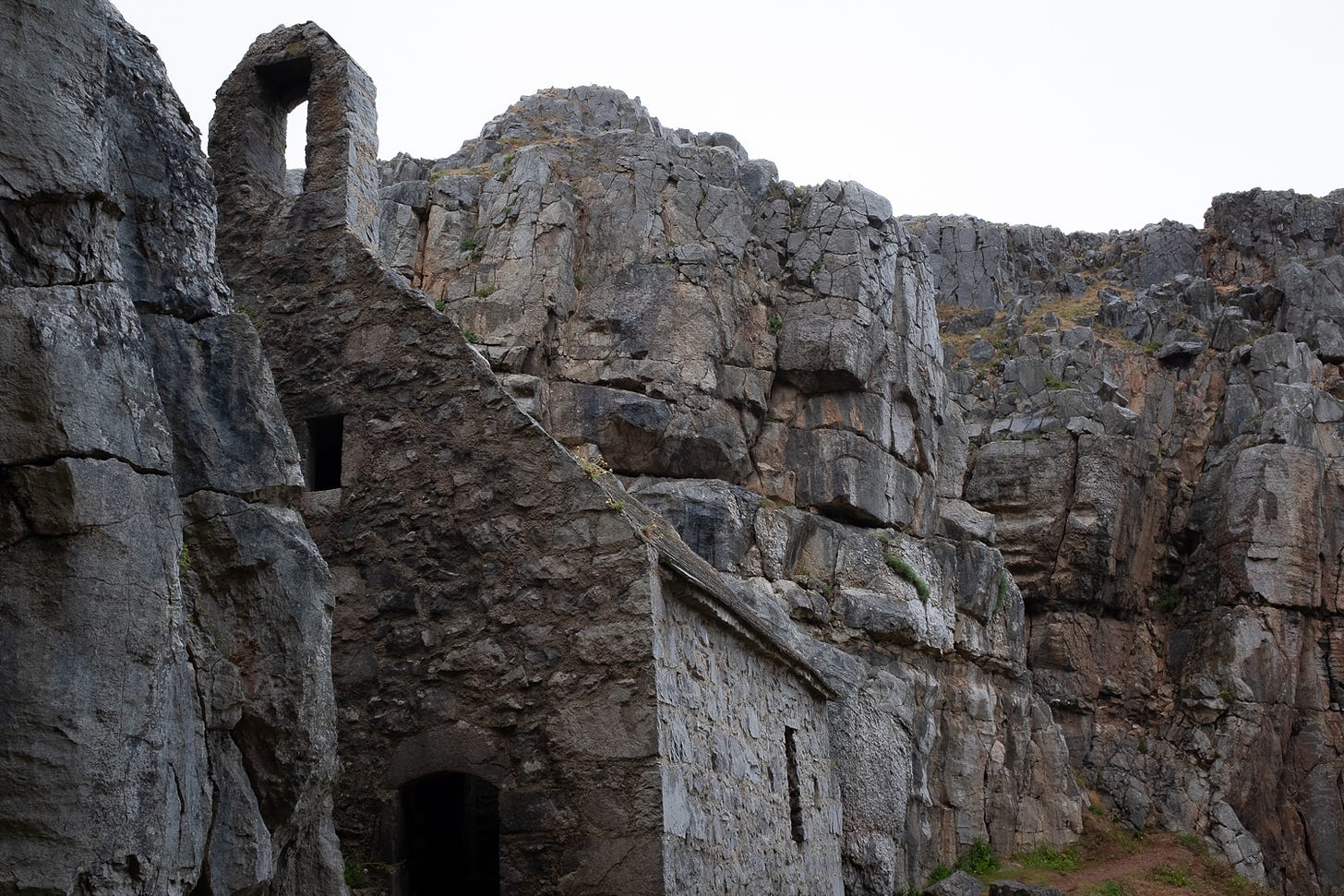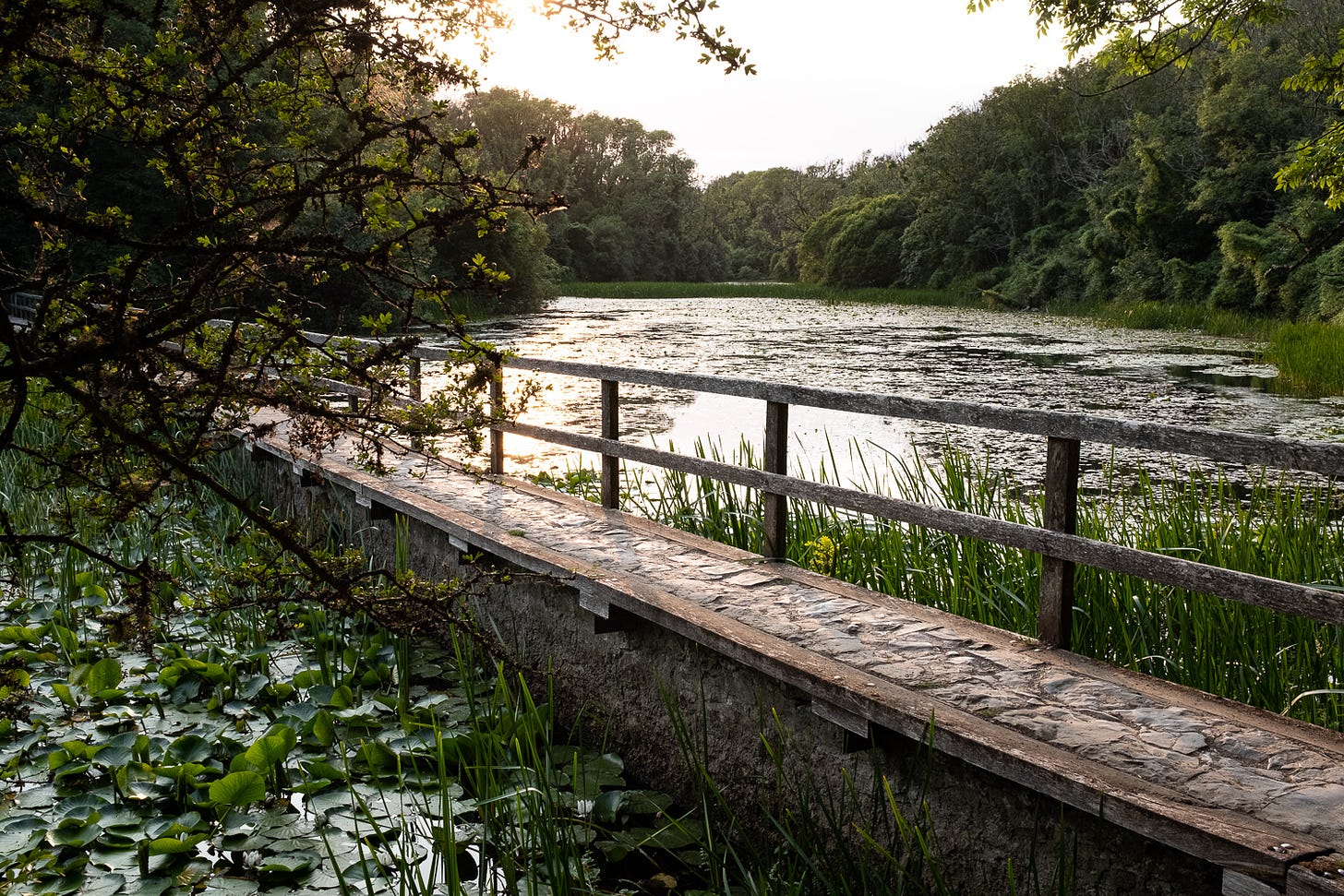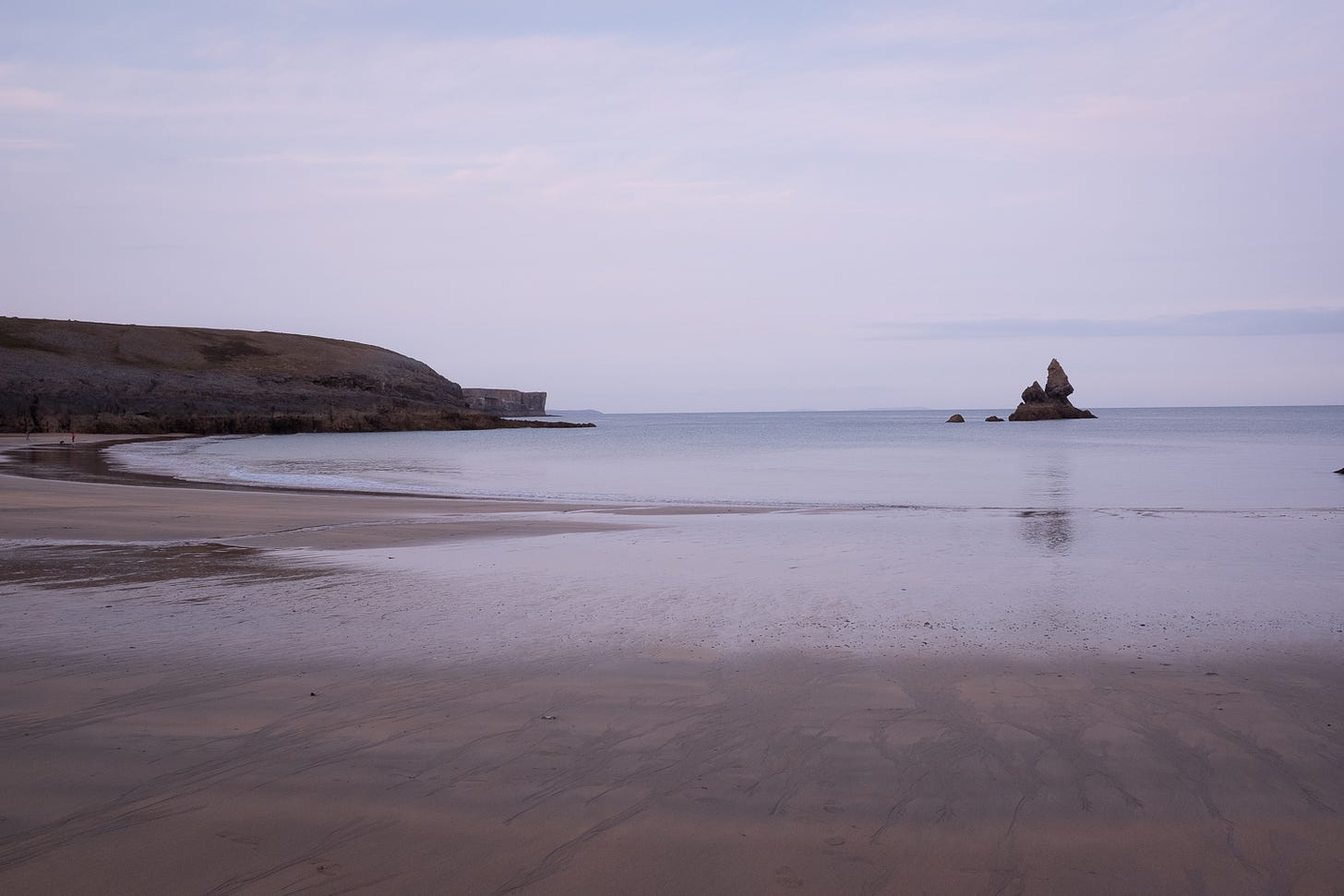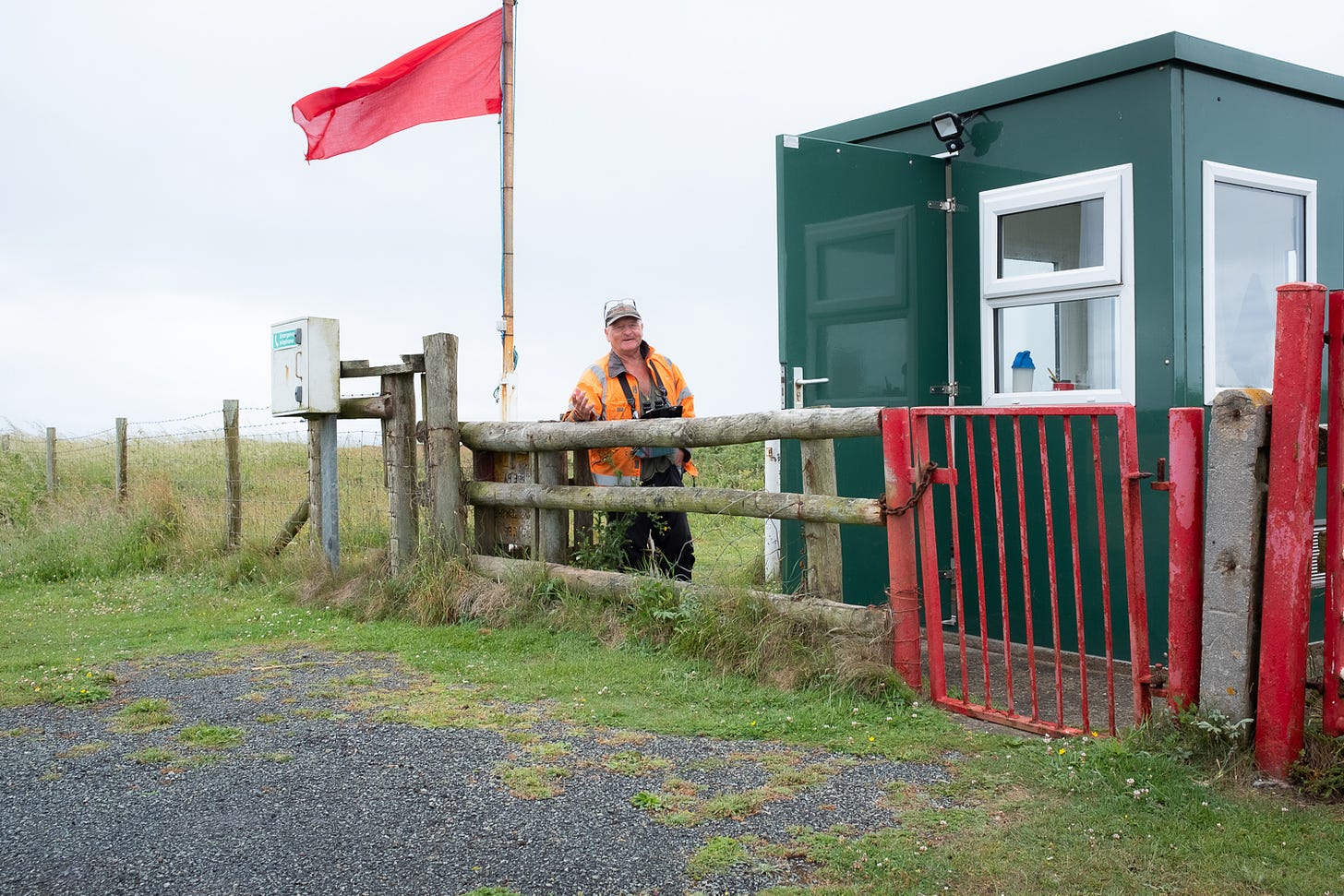A wind of cloud and rain harried the clifftops and quivered the sea thrift. The road of sharp stones was in two dappled lines a wheels width apart. I walked it barefoot, hoping the moss would clean the sand from my feet but it just seemed to make it worse. Exhilarating as the landscape was, it was hard to appreciate in the assaulting drizzle. I didn’t have a waterproof either.
The path followed the clifftops through the gorse and heather on towards St Govan’s Chapel. Every few hundred yards there’d be a hut with a flagpole stationed in the bracken. A man in a big orange coat leant against the last next to a hoisted red flag. He held a pair of binoculars to his eyes and scanned the metallic sea as it frothed and threatened the cliffs. In the distance you could hear the tat tat tat of the firing range. He nodded as I trudged past.
The Chapel of St Govan is a strange place, a limestone cubical built into the cliffside. It looks as if someone wedged it there to stop it slipping into the sea. You approach it from above, through a cleft in the rocks and down steep steps that drop under the slate roof. The splatter of rain echoes off the rock.
St Govan himself was an Irish monk who came to Wales in the 6th century. Almost nothing is known about him though the legend says that as he rounded the coast he was attacked by Irish pirates. He fled to the headland where miraculously the cliffs opened up for him revealing a cave. He leapt in and the rock closed around him, hiding him until the pirates gave up their search. St Govan was so grateful he decided never to leave, to devote his life to God as a hermit on the edge of the world. He ate fish from the sea and drank water from springs.
For some reason, people thought this was admirable and centuries later the chapel was built to celebrate him and his strange existence. It still stands today, although sits is probably a better word.
Bleak and wet, it was a good day to see it. The stone shone, pulsing as water trembled down the walls. Beyond the altar was the tiny cavity St Govan lived in. They say the marks on the wall are from his ribcage when the rock encased him. Through the other door, the sea roiled and the cliffs, even and angular, stretched around the coast. I wondered what it would be like to live here. Nothing but rock and gulls for company. I concluded it would be pretty miserable.
I returned to the clifftops. The man was still scanning the horizon. Morning, I said with a forced smile as I reached the top of the stairs. It had only just gone 9, and, wet and pretty miserable myself, I wasn’t in the best of moods. The man’s big bare chest bristled with silver hair under his fluorescent coat and the blood-red flag throbbed in the wind behind him.
Pete was a friendly man, glad to be chatting, and his open smile cheered me immediately. His cabin looked cosy. There was a wooden chair piled high with cushions. I told him I’d spent the night on the beach. Pete said it was beautiful there and I agreed though the practicalities of actually camping on it were rather less romantic than I’d imagined. I told him all about it.
It had been an exquisite evening the night before. I approached the beach along a serene river. The obsidian surface was padded with lilies and the swans were reflected perfectly. Their necks looked like curved white bows. Then the beach opened out. It had its own bay with a single jagged rock that stood out of the settling blue. There was no breeze to disturb it and I had it all to myself.
I pitched my tent and stripped off, slipping into the sea. But it went downhill from there. As I got out, sand burrowed between my toes, climbed up my ankles, stuck to my fingers and eventually found its way into my tent and sleeping bag. The seawater became sticky on the skin. I began to regret swimming and began to regret camping on the beach.
Then the weather changed. It rained all night, drumming on my tent and denying me any hope of sleep. In the morning it wasn’t just me that was covered in wet sand. Any attempt to rub or shake it off the canvas merely transferred it. I foolishly decided a morning swim would make me feel better. It did momentarily but then I got out and found myself even sandier and stickier than before.
I packed my tent and half of Broad Haven beach and traipsed barefoot through the rain onto the clifftops. Now here I was telling Pete my sorry story. He laughed warmly and we agreed that sand and rain were not good companions.
Pete told me he worked for the Castlemartin MoD training area. He had for 30 years. He was propped cheerfully against the fence, elbow on the pole, thumbs hooked in his vest. He had a merry face, smooth hard skin and a wrinkled neck. His front teeth were missing but it didn’t stop him smiling.
“I spent the first ten years working in the camp, I did,” he recalled with a rolling Welsh burgh, “Then they moved me out here and I’ve been in heaven ever since!” He took a deep breath of rich sea air. He said he could be stationed at any of the huts. Whichever would be the edge of the firing range that day but this was his favourite one. He liked being near the chapel.
“Oh you wouldn’t believe some of the stuff you see,” he chuckled, “Once I caught three people sleeping in the chapel. Three blokes it were hoo hoo!” He set off laughing at the memory and the glint in his eye suggested the blokes hadn’t been doing much sleeping.
I told him I was from London and he said his grandson lives there too: “Ahh he loves it there he does. I could never live there though like,” again he took a deep breath and scanned the sea, “I love the coast too much. Born and bred here like. Couldn’t ever leave it.”
“You’re like St Govan,” I remarked and he chuckled, “Maybe they’ll turn your hut into a chapel one day.”
It was still a mile to Bosherton and I doubted the single-track lane to Pembroke would have much traffic at this time of day. I’d probably have to walk most of it. I kicked myself again for forgetting a waterproof and told Pete I’d best be getting on.
“Thanks, Pete,” I called as I left, “You’re a legend!”
“A legend?” He called back, “That’s what my grandkids say! The myth… the grandad… Papa legend…No what is it?”
“The man, the myth, the legend?”
“Ah yes hoo hoo! That’s the one!”
I set off up the track. “What’s your name by the way?” he called after me.
“Nico,” I shouted back over the wind.
“You a single man are ya Nico?”
The question was surprising given we were now quite far apart. “Not as single as St Govan,” I replied and we shouted a long-distance conversation about my relationship status before he waved me off, his hand momentarily in tandem with the red flag above. Then he picked up his binoculars and set about scanning the horizon again, content as anything.
The guns tatted across the heather like woodpeckers. On the path I passed a couple I’d met the evening before in the St Govan’s Inn in Bosherton. We’d had a pint and they told me they were walking the Pembrokeshire coast path. They were the ones to suggest I camp on the beach.
“How was it?” they asked eagerly.
“Ah, it was… wonderful,” I replied as a drop of water appeared on my nose. They looked at my bedraggled state and no doubt caught my drift, but they were full of enthusiasm, grinning from under their hats and telling me all about their walk. As with Pete, I felt in a much better mood when we shook a damp handshake and said goodbye.
There’s nothing for the soul like company I thought as I stomped on with renewed vigour, a sudden bob in my step.
Maybe someone should have told St Govan that.






